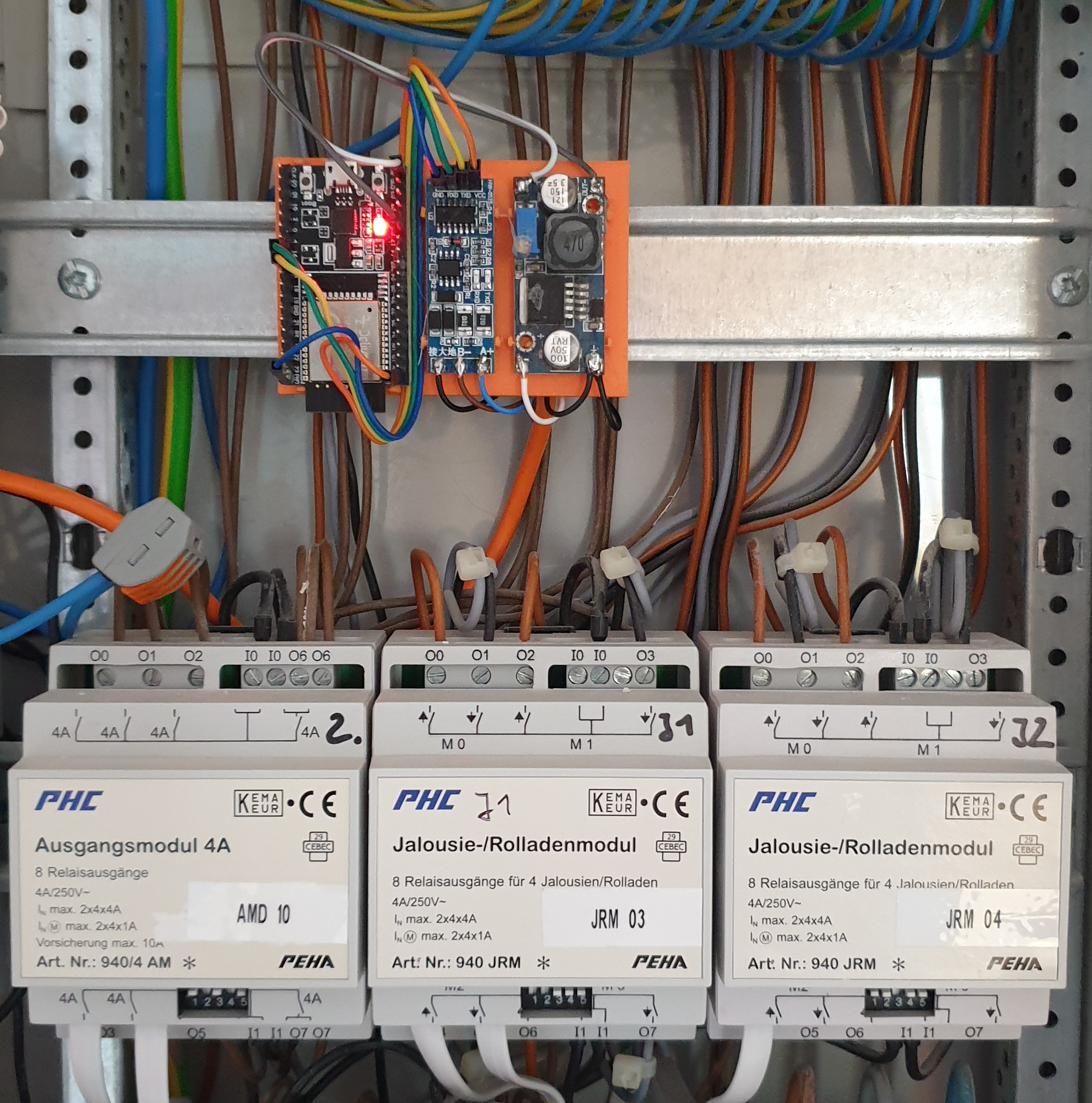This project implements a PEHA(acquired by Honeywell) PHC Controller which integrates into Home Assistant through ESPHome. This solution can replace an existing dumb controller (STM - Steuermodul), thus smartifying an existing PEHA PHC installation.
 Smart PHC controller with PHC-Modules. A close up of the board containing the ESP32 with the RS-485 converter and a step-down module can be found here.
Smart PHC controller with PHC-Modules. A close up of the board containing the ESP32 with the RS-485 converter and a step-down module can be found here.
This project has been developed and tested on an ESP32. A ESP8266 is probably going to work just fine. For best results use an ESP32 in combination with the Arduino Framework. The use of the and ESP8266 or the IDF framework will likely result in incorrectly timed messages on the bus.
The PHC-Bus is RS-485 based. In order communicate on the bus a RS-485 TTL Adapter is required. Currently only a Chip with automatic flow control has been tested. Connect the A/B wires to the PHC-bus. This can easily be done using the screw-terminal on the power-supply (see). Finally connect the RS-485 adapter to your ESP and you are good to go.
With the help of a step-down module/voltage converter the 24V supplied by the PHC-power-supply can be used to power the ESP.
Make sure to remove any existing controllers (STM - Steuermodul) from the bus, as they will interfere.
A example configuration can be found here
- id(Required, string): Controller ID which will be used for entity configuration.
- uart_id(Required, string): ID of the UART-Component connected to the PHC-Bus
- phc_controller_id(Required, string): The PHC-Controller to which this entity belongs
- address(Required, int): Module DIP-Switch address
- channel(Required, int): Output channel on the Module
- All other options from Switch
- phc_controller_id(Required, string): The PHC-Controller to which this entity belongs
- address(Required, int): Module DIP-Switch address
- channel(Required, int): Output channel on the Module
- All other options from Light
- phc_controller_id(Required, string): The PHC-Controller to which this entity belongs
- address(Required, int): Module DIP-Switch address
- channel(Required, int): Output channel on the Module
- All other options from Light
- phc_controller_id(Required, string): The PHC-Controller to which this entity belongs
- address(Required, int): Module DIP-Switch address
- channel(Required, int): Output channel on the Module
- All other options from Binary Sensor
-
phc_controller_id(Required, string): The PHC-Controller to which this entity belongs
-
address(Required, int): Module DIP-Switch address
-
channel(Required, int): Output channel on the Module
-
max_open_time(Optional, Time): Determines for how long the Output will be enabled while opening. This value should guarantee the cover reaches it's open state. Defaults to
30s. -
max_close_time(Optional, Time): Determines for how long the Output will be enabled while closing. This value should guarantee the cover reaches it's closed state. Defaults to
30s. -
assume_position(Optional): Assume the covers position based on measured open/close times
- open_time(Required, Time): The time it takes to open the cover completely from it's closed state. Must be smaller than
max_open_time. - close_time(Required, Time): The time it takes to close the cover completely from it's opened state. Must be smaller than
max_close_time.
- open_time(Required, Time): The time it takes to open the cover completely from it's closed state. Must be smaller than
-
All other options from Cover
Without previous reverse engineering work done by others this would have been a lot more time consuming.
- The UART debug function can be used to analyze communication on the bus.
- Kown Memory Issues:
- ESP8266 out-of-memory exception
- Guru Meditation Error: exception caused by
LOOP_STACK_SIZEexceeded